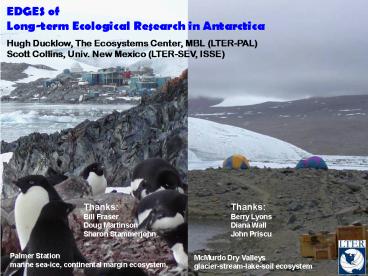EDGES of - PowerPoint PPT Presentation
1 / 21
Title:
EDGES of
Description:
Possible violations or abrogation of Antarctic Treaty (already occurring) ... Independent: Chinstrap & Gentoo penguins, elephant & fur seals. Bill Fraser. Palmer LTER ... – PowerPoint PPT presentation
Number of Views:41
Avg rating:3.0/5.0
Title: EDGES of
1
EDGES of Long-term Ecological Research in
Antarctica Hugh Ducklow, The Ecosystems Center,
MBL (LTER-PAL) Scott Collins, Univ. New Mexico
(LTER-SEV, ISSE)
Thanks Thanks Bill Fraser Berry
Lyons Doug Martinson Diana Wall Sharon
Stammerjohn John Priscu
Palmer Station marine sea-ice, continental
margin ecosystem,
McMurdo Dry Valleys glacier-stream-lake-soil
ecosystem
2
Other LTER people and relevant statements Byron
Adams Berry Lyons Doug Martinson Sharon
Stammerjohn Diana Wall Kevin Arrigo Dont think
of it as LTER think of this research as AISS
Sustained, integrated systems science about
Antarctica
3
LTER Edge questions for AISS
- How do polar ecosystems respond to the press and
pulses of climate change? What are the climate
thresholds triggering ecosystem regime change? - What are the biophysical ecological mechanisms
governing responses? - How does multiscale climate variability influence
polar ecosystems? - How is Antarctica coupled to the global
socioecological system?
4
A vastly changed continent in coming
decades Rapid climate change Receding glaciers
ice shelves Species invasions, extinctions,
range changes Possible violations or abrogation
of Antarctic Treaty (already occurring) Colonizat
ion, exploitation, tourism Research needs for
AISS Continued long-term commitment Continenta
l-scale approach International collaboration
(closer) Human dimensions / social sciences
integration
Future challenges for Long-term Ecological
Research
5
Future challenges for Long-term Ecological
Research
6
PALMER ANTARCTICA LONG TERM ECOLOGICAL
RESEARCH 1990 2008 Marine ecosystem of the
Western Antarctic Peninsula (WAP)
The WAP is the only location in Antarctica where
the Antarctic Circumpolar Current (ACC) is
directly adjacent to the shelf break. The ACC is
Antarcticas warmest water.
D. Martinson
Doug Martinson, Bill Fraser
7
Upwelling environment Webb-Slocum Rutgers Glider
Jan
6-23 07
Latitude
Longitude
8
Climate Changesurface air and ocean temperatures
Ocean temperature increases
regime shift?
Doug Martinson, Bill Fraser
9
SEA ICE in PAL study region
Perennial Ice
Sharon Stammerjohn
10
Changes in seabirds and mammals at Palmer Station
1976 - 2006
Ice-dependent Adélies, Crabeater Weddell
seals. Independent Chinstrap Gentoo
penguins, elephant fur seals
Bill Fraser
11
Palmer LTER
- Marine Ecosystem rich in large vertebrate
predators - Rapid regional warming
- Decline of sea ice duration extent
- Loss if ice-dependent species
- Invasion of ice-tolerant spp
- Changes at lower trophic levels biogeochemistry
harder to detect - Teleconnections and interactions of ENSO SAM
- No terrestrial organic matter subsidies (yet?)
12
McMurdo Dry Valleys LTER 1993-2011
Glaciers
Soils
Lakes
Diana Wall
13
The Dry Valley Ecosystem Bacteria, algae,
nematodes, tardigrades, protozoans, rotifers
Alan Tunnacliffe
Diana Wall
Randy Miller
14
Taylor Valley at Last Glacial Maximum with 340m
H20 asl
John Priscu
15
Taylor Valley today
John Priscu
16
(No Transcript)
17
Water content and Nematode Dynamics
No. organisms/kg soil
0
No. organisms/kg soil
0
Multiple regression analysis showed that 63 of
variation for E. antarcticus could be explained
by soil water and chlorophyll a content (P0.034)
1999
2000
2001
2002
2003
2004
2005
1998
18
Dry Valleys
- Cold, dry, water limited soil ecosystem
- Simple ecosystem with few metazoan predators
sensitive to small environmental changes - Lake metabolism receives legacy organic matter
from previous high stands - Strong biological/ecosystem responses to climate
trends and climate events - Climate/ecosystem modulation by SAM
19
Southern Annular Mode (SAM or Antarctic
Oscillation) was in a positive phase causing a
strong polar vortex preventing warmer air from
mixing with frigid polar air
2001-02 Switch to negative SAM
- McMurdo LTER started in 1993
- Nature cooling trend paper
LAKE ELEVATION
John Priscu
20
Back to Palmer 2001-02 switch to negative SAM
heavy ice, cold temperatures, spring snowstorms
near-total penguin breeding failure
21
Ecological dynamics linked by climate
teleconnections
- Dry Valleys decadal cooling trend in response to
positive SAM - Palmer decadal warming trend enhanced by
positive SAM - Dry Valleys 2001-02 warming, flooding event
- Palmer 2001-02 cooling, snow (flooding) event
- Similar ecosystem responses in both systems at
upper trophic levels































